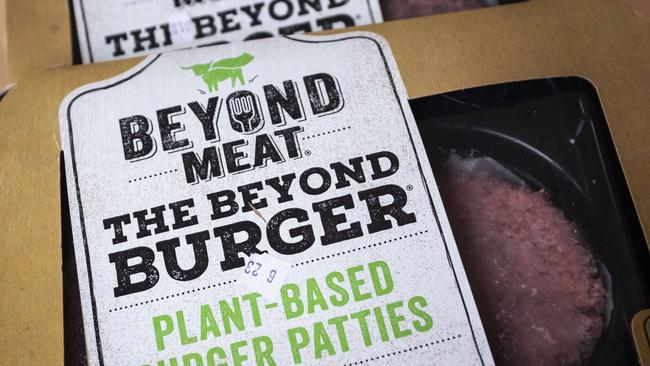Plant-based proteins play on guilt, while GM yeast is real revolution
Forget the Impossible Burger, GM yeast is where the real future of alternative foods lies.

THE future of food lies far beyond the marketing hype of California’s Impossible Foods “bleeding” burgers, Moving Mountains’ “game-changing” sunflower-seed hot dogs, fishless fillets, plant milks, mock chicken and vegan prawns.
Look past the slogans to the mind-boggling array of ingredients and you’ll see there’s little that’s revolutionary in the pea and soy-based snags and burgers being shoved on to barbecues this Christmas.
Sure they taste a lot better than the tins of nut meat Sanitarium has been selling to its Seventh-day Adventist consumers since 1912. But does the addition of some red seaweed extract, methylcellulose and a bit of fibre count as “game changing”?
READ MORE: AGJOURNAL
AGRICULTURE’S 20 HOT ISSUES FOR THE 2020S
MACQUARIE BANK’S FIELD MARSHAL TAKES CHARGE
And how many Australian families can afford the Beyond Meat burgers sitting in the Coles fridge for $52.86 a kilogram or the bizarrely titled “Sunfed Chicken Free Chicken Wild Meaty Chunks”, which carries an image of a strutting rooster and costs $36.70 a kilogram?
Many of these products are fully imported and highly processed, with up to 30 ingredients, unlike fresh meat and dairy. The Beyond Meat burger is made in the US from domestic and imported ingredients, and claims to be full of “marbled juiciness”, a complete protein and “Now even Meatier”.
It’s clear these much-hyped foods are aimed at a market that goes far beyond animal-welfare activists to the masses rallying across the globe calling for “climate action”. The message is simple – cut your carbon footprint by shunning those carbon-emitting cows and enjoy a plant-based alternative that looks feels and possibly tastes just like meat or milk.
Of course you can “Go vegan to save the planet”, but these mock meats are transitional foods for the omnivorous masses, looking to ease their carbon guilt, while still burning up tonnes of fuel on regular overseas trips.
Impossible Foods’ mission statement declares the firm wants “to restore biodiversity and reduce the impact of climate change by transforming the global food system” by making “delicious, nutritious, affordable and sustainable meat, fish and dairy directly from plants”.
And of course they’ve taken a swipe at livestock production’s environmental credibility. “Animal agriculture occupies nearly half of the world’s land, is responsible for 15 per cent of global greenhouse gas emissions and consumes 25 per cent of the world’s freshwater,” Impossible Foods warns.
These are not idle claims. A recent peer-reviewed article in the widely respected Science magazine examined five environmental indicators across 38,700 farms and 1600 processors, packaging types, and retailers, concluding “a diet that excludes animal products has transformative potential, reducing food’s land use by 3.1 billion hectares (a 76 per cent reduction)”. It’s a powerful argument, but the reality is most of the world’s population ain’t buying it. The Food and Agriculture Organization of the United Nations’ 2018-2027 Outlook estimates “global meat consumption per capita is expected to increase to 35.4kg by 2027, an increase of 1.1kg compared to the (2017) base period”.
Rapid urbanisation, rising affluence and population growth have led the FAO to forecast global meat production will rise 15 per cent, to 386 million tonnes in 2027, from 336 million tonnes in 2018. The same factors are driving a surge in global dairy demand, with per capita consumption expected to rise over the same period from 10.6kg to 13.5kg in developing countries and 22.2kg to 23.1kg in developed nations.
The FAO estimates dairy farmers will respond by lifting global milk production by 22 per cent by 2027.
CELL COUNT
Those focusing on a plant-based utopia are missing the bigger picture – the real advance is coming from science. There is no way the global surge in demand for animal protein is going to be met by bleeding plant-based burgers and mock chicken. Neither will the froth and bubble of soy, almond and oat milks, which are taking over Australia’s cappuccino cafe culture, pose any real threat to the world’s dairy herds.
The real revolution is occurring in US, Israeli and European laboratories, where cellular agriculture is on the verge of delivering a major blow to global livestock production.
San Francisco biotech firm Perfect Day has genetically modified a yeast to produce bovine casein in fermentation vats; US firm Clara Foods is making egg whites using the same technology, while others in Israel and Europe produce lab-grown chicken and beef.
Just like their plant-based rivals these companies spruik the environmental benefits of using no animals and less water, transport, space and greenhouse gases. But unlike their rivals, these biotech firms are offering pure animal meat and milk proteins, which can be fed straight into existing supply chains.
READ MORE: AGJOURNAL
JIGSAW FARMS HITS CARBON-NEUTRAL GOALS
FARMERS FLOCK TO PADDOCK-TESTED AGTECH
Perfect Day’s GM yeast has the potential to replace millions of tonnes of cow casein and whey proteins that go into a vast array of manufacturers’ products – from chocolate and noodles to infant formula, cosmetics and even plastics.
Fermentation vats of GM yeast could be built close to major manufacturing hubs, replacing millions of tonnes of milk, meat and egg proteins that we currently derive from cattle, chickens, eggs and pigs.
Of course, consumers will continue to demand fresh milk, yoghurt and cheese, straight from the cow, while many will still want natural steaks and roast chicken on the menu.
But will they really care about cellular agriculture’s non-animal proteins making their way into the huge array of processed foods that line the supermarket shelves?


